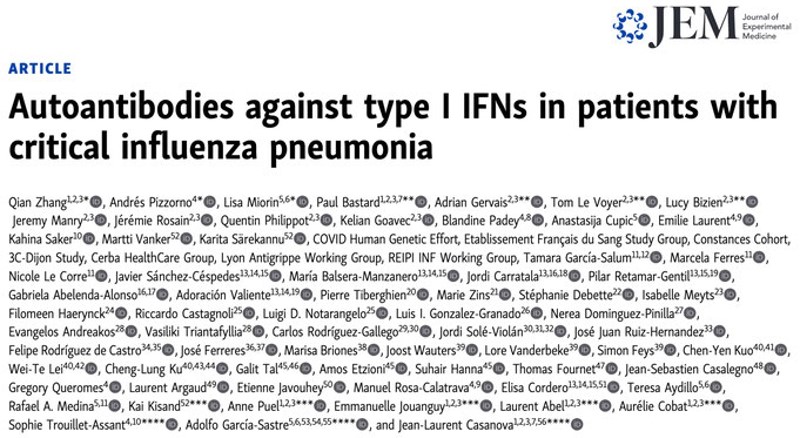This study reports that almost 5% of patients with critical influenza pneumonia studied internationally (cohort of 279 patients) had auto-Abs neutralizing IFN-α2 alone or with IFN-ω. By performing functional assays in our predictive models of influenza infection in reconstituted Human Airway Epithelium (HAE MucilAir), we further demonstrated that IFN-α2 treatment or IAV infection induced the expression of IFN-stimulated genes (ISGs), and that this expression was blocked by auto-Ab–positive plasma from patients with critical influenza, leading to increased viral replication and tissue damage, together with the production of proinflammatory cytokines by damaged cells.
These results highlight the putative contribution of auto-Abs to the severity of influenza and other respiratory viral infections, especially COVID-19, in which our previous work showed a 15% prevalence of these auto-Abs in patients with critical SARS-CoV-2 pneumonia (Bastard et al., Science 2021) and confirmed for the first time their role in abrogating the antiviral effects of IFN-I in SARS-CoV-2-infected HAE (Lopez, Pizzorno et al., JEM 2021).
Virnext is very proud to be part of this international collaboration led by Zhang S. at Casanova lab, Lisa Miorin at GarciaSastre lab and Andres Pizzorno at VirPath lab. We are supported by INSERM Institut national de la santé et de la recherche médicale #REACTing (Research & Action Emerging Infectious Diseases), CNRS – Centre national de la recherche scientifique, Région Auvergne-Rhône-Alpes, ANRT – Association Nationale de la Recherche et de la Technologie and INSTITUT MÉRIEUX (#MérieuxResearchGrant).


